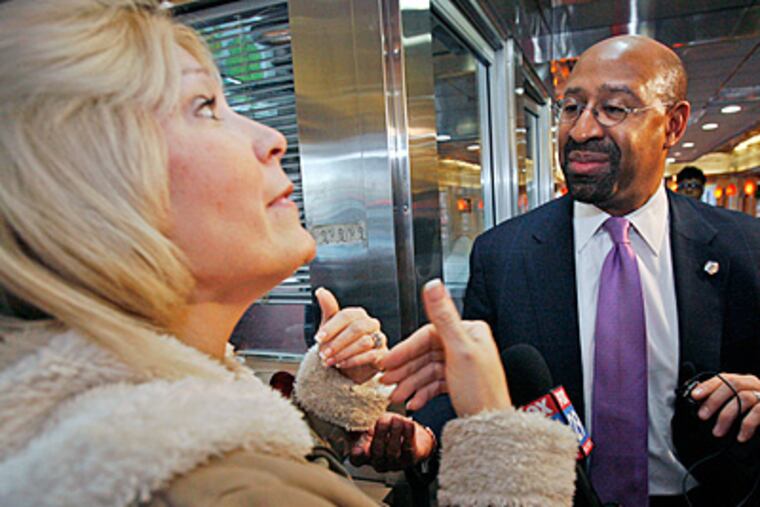Karen Heller: Offer of soda-industry funds fell flat, as it should have
The offer from Children's Hospital of Philadelphia to fund an antiobesity program, financed by the soda industry, just fizzled like so many flat colas.

The offer from Children's Hospital of Philadelphia to fund an antiobesity program, financed by the soda industry, just fizzled like so many flat colas.
We have a monstrous obesity problem, and Philadelphia could use the money. But saying no was the obvious choice for the Nutter administration, waging a campaign for healthier diets.
The choice was also right.
"It seems to me that accepting money from the beverage industry to fight obesity would be like taking money from the NRA to fight gun violence or from the tobacco industry for smoking cessations," Mayor Nutter said. "I mean, it's ludicrous."
Instead of blood money, this was fat money.
The funds, part of a $10 million grant from the American Beverage Association, was specifically targeted to government programs. "The city health centers were the only ones being offered this funding, when there are other federally qualified health centers," said health commissioner Donald Schwarz, a pediatrician and former Children's Hospital of Philadelphia division chief in adolescent medicine. There was no legal conflict. He checked.
"Taking money from the beverage industry when we are often and several times in conflict, I have to worry about appearances but what I really worry about is substance," Schwarz said, noting that "if the beverage industry came, as they have in the past, and said, 'We'll fund something in exchange for you not introducing a sugary beverage tax in the future,' this was not appropriate."
Schwarz made the decision in consultation with Nutter, who keeps a Mountain Dew bottle in his office not as a thirst-quencher but as a political tool, informing visitors that the 20-ounce soda contains the equivalent of 19 packets of sugar.
"It's really nothing more than fat in a bottle," Nutter said. "And there's very little recognition by the industry of the problems and challenges that their product creates."
The city has become "ground zero in the beverage wars," noted University of Pennsylvania bioethicist Arthur Caplan.
Obesity is a leading contributor to many life-ending illnesses. More than half the city's children are obese or overweight; in North Central Philadelphia, the rate is a staggering 70 percent. Almost a third of our adults are obese, and one in eight has Type 2 diabetes.
When it comes to being unhealthy, and most of these dietary ailments are tied to poverty, Philadelphia has few equals. The city ends up paying for these problems with a sicker and less productive population dependent on increased social and health services.
The mayor has been consistent in his attempts to reduce soda consumption but inconsistent in policy.
Last year's proposed beverage tax was sold as a health initiative. This year's tax was a budgetary Band-Aid. Both efforts failed, thanks in large part to a rich beverage industry that went to battle.
To the surprise of no one, City Council criticized the administration's rejection. "A lost opportunity," opined Jim Kenney. "We shouldn't refuse resources that are provided for what is a stated objective of the administration, fighting obesity," said Bill Green.
The moment a legislative body lectures you on ethics and policy, you know you're moving in the right direction.
Nutter's most consistent issues are matters of public health - he led the indoor smoking-ban campaign when he was in Council - and ethics reform.
Accepting the money would have been a giant ethical step back - imagine the field day Council and the industry would have had - while doing little to improve health. The Children's gift was rebuffed before any program specifics were discussed.
"We have federal funding, people should know. We have money to fight obesity and smoking," Nutter said.
The federal government is also inconsistent in fighting obesity, providing a boondoggle of subsidies to farmers to grow corn - its syrup a primary culprit in our sugar-rich diet - while the first lady exhorts us to eat healthy. Cutting crop supports would do far more good than organic gardens.
Conflicts exist inside Children's as well, with a McDonald's in the building, and a Ronald McDonald House nearby for ill children and their families. "CHOP is a great institution," Nutter said. "They can do what they want."
Caplan said "hospitals have their own issues about how they deal with gifts. But when you're pushing for legislation and leading the policy debate, turning down the money is a no-brainer."
Citizens and City Council members may castigate Nutter as embracing the nanny state, advocating what's best for others. But given Philadelphia's health problems, which are the envy of no one, we could use the help.